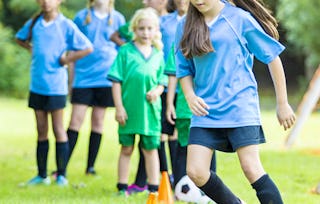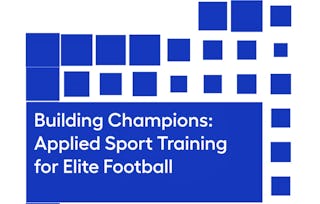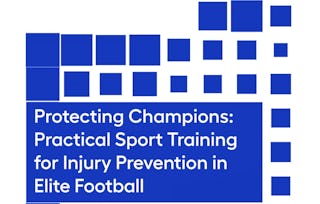Seventy percent of kids drop out of sports before their high school graduation. Only 15% leave because they feel they are not good enough. Almost 70% leave because they were not having fun, or due to problems with the coach. Injuries cause 30% to give up sports. This course is packed full of practical sports science information that provide youth coaches and parents with the practical pediatric sports science insights to successfully retain young athletes and develop their sport potential while avoiding injury and overtraining. We begin by examining the multidimensional nature of coaching, the relevant sport motor performance abilities, the impact of growth and development on motor skills, the gene versus practice controversy, and briefly overview the body structures strengthened through training. Then we explore the athlete's energy supply, where this energy comes from, and how it matures along with the athlete. Finally, we examine the development of strength, power, anaerobic capacity, coordination and flexibility through the life span.

Ends soon: Gain next-level skills with Coursera Plus for $199 (regularly $399). Save now.

The Science of Training Young Athletes

Instructor: Dr. Chris Brooks
43,735 already enrolled
Included with
(982 reviews)
Skills you'll gain
Details to know

Add to your LinkedIn profile
See how employees at top companies are mastering in-demand skills

There are 5 modules in this course
Youth coaches who have a sound understanding of pediatric sports science are essential to the successful development of a young athlete’s sport potential. In this section you are introduced to the multidimensional nature of coaching, and how an athlete’s motor abilities of endurance, strength, speed, coordination and flexibility are affected by growth and maturation. The manual is available in the Resource Section.
What's included
23 videos3 assignments2 discussion prompts
Many factors can positively and negatively impact the young athlete’s ability to optimize their sports potential. In this section we examine strategies for ensuring the athlete’s systematic long-term sports development and how to mold the correct sport-specific phenotype.
What's included
20 videos3 assignments1 discussion prompt
The coach is a microbiologist who designs training so it stimulates the body’s cells and structures to become stronger and more efficient. In this section you are introduced to key organ systems, and the energy these organ systems use to run the chemical reactions needed for a sports performance. You will also learn how diet can positively enhance an athlete’s ability to train and compete.
What's included
18 videos3 assignments1 discussion prompt
The level of expertise with which an athlete is able to perform sports skill depends on how well the coach molds the correct ratio of endurance, strength, power and speed to meet the demands of the sport. In this section you will learn the science behind developing these important motor performance abilities as the young athlete moves through puberty.
What's included
23 videos4 assignments1 peer review1 discussion prompt
Coordination and flexibility permit movements that are precise, fluid and spatially controlled. In this section we examine current knowledge about coordination and flexibility as the young child moves through early childhood and into adolescence.
What's included
21 videos2 assignments1 discussion prompt
Instructor

Offered by
Explore more from Personal Development
 Status: Preview
Status: PreviewUniversity of Florida
 Status: Free Trial
Status: Free TrialReal Madrid Graduate School Universidad Europea
 Status: Free Trial
Status: Free TrialReal Madrid Graduate School Universidad Europea
 Status: Free Trial
Status: Free TrialNiel Asher Education
Why people choose Coursera for their career




Learner reviews
982 reviews
- 5 stars
88.09%
- 4 stars
9.86%
- 3 stars
1.22%
- 2 stars
0.20%
- 1 star
0.61%
Showing 3 of 982
Reviewed on Apr 18, 2020
A great thanks to my course instructor Dr Brooks and to my peers,believe me its very rich and would inform many friends to benefits too. keep the spirit and never stop learning.
Reviewed on Apr 30, 2020
The course was explained comprehensively.. thank you so much for making this course, I have learned a lot. I can surely use this knowledge in my class as Physical Education teacher
Reviewed on Sep 2, 2020
I found the teachings here very useful for my career path. It helped me understand how to treat kids better when teaching them sport and how to take care of them

Open new doors with Coursera Plus
Unlimited access to 10,000+ world-class courses, hands-on projects, and job-ready certificate programs - all included in your subscription
Advance your career with an online degree
Earn a degree from world-class universities - 100% online
Join over 3,400 global companies that choose Coursera for Business
Upskill your employees to excel in the digital economy
Frequently asked questions
To access the course materials, assignments and to earn a Certificate, you will need to purchase the Certificate experience when you enroll in a course. You can try a Free Trial instead, or apply for Financial Aid. The course may offer 'Full Course, No Certificate' instead. This option lets you see all course materials, submit required assessments, and get a final grade. This also means that you will not be able to purchase a Certificate experience.
When you purchase a Certificate you get access to all course materials, including graded assignments. Upon completing the course, your electronic Certificate will be added to your Accomplishments page - from there, you can print your Certificate or add it to your LinkedIn profile.
Yes. In select learning programs, you can apply for financial aid or a scholarship if you can’t afford the enrollment fee. If fin aid or scholarship is available for your learning program selection, you’ll find a link to apply on the description page.
More questions
Financial aid available,
¹ Some assignments in this course are AI-graded. For these assignments, your data will be used in accordance with Coursera's Privacy Notice.

